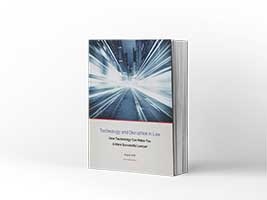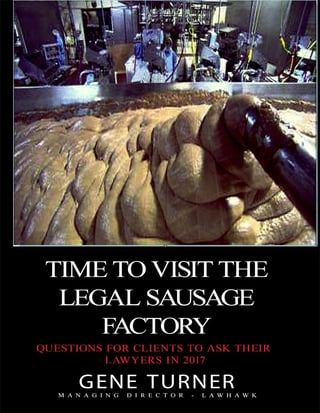2017 is when the changes will become real
2017 will be a big year for the legal profession. 2016 was a year everyone talked about "disruption" and all the changes that are going to happen. 2017 will be a year where the changes start to be seen and therefore become “real” in the minds of many lawyers.
Those lawyers and organisations that have been trialling technology will move to more extensive adoption. They will start to publicise it and the benefits they can offer, as they seek to differentiate and profit from it.
There is an increasing awareness of the changes that are coming, as stories like this (Rebooting the Legal Profession) profile what the leading firms in Australia and elsewhere are doing and planning. Last week's blog (Shit Just Got Real! Changes to law ARE coming) gave a wider view of what is happening.
Yet there is still reluctance to look at new legal technology…
And yet, there is still a reluctance from many law firms to even look at adopting new technology. As one lawyer put it to me in 2015, given they are well paid for taking hours to do jobs that can be done almost instantly with automation, “why would we do anything until the day before we have to?”.
18 months later lawyers are still unsure what new technology will mean for them, and whether it will replace or enhance them. They are waiting to see others move first, so they can be “fast followers”.
Two circuit breakers are needed
This reluctance and uncertainty means that two things will be needed to encourage broader and faster adoption:
- Lawyer will need to see other lawyers adopting technology and benefiting from it. In practice, this means they will need to start losing some work to more technologically advanced competitors; and
- As George Beaton has noted, in-house legal teams will need to drive the change by being more demanding and requiring it from their lawyers – something they are not yet doing.
Why haven’t in-house legal teams been forcing the change?
This second aspect puzzles me, because CEOs and CFOs clearly expect their legal teams to reduce legal costs and obtain better value.
There is no doubt that in-house lawyers have become more assertive in demanding more from their law firms, but so far the demands have been more tactical than strategic – steep discounts to hourly rates, lengthy secondments at cost, free training, or to work through the night on an urgent transaction. Firms have shown that they are willing to do almost anything that the client wants in these areas, and I’m sure they will do the same with regard to more systemic issues around the way they work – if they need to, to win work.
This leads me to believe that a major hurdle to overcome is that so many in-house lawyers think their lawyers have better systems and work more efficiently than they actually do, and so are not asking for these improvements. A number of times when I have demonstrated LawHawk’s document automation to in-house lawyers they say that it looks great relative to how they work as in-house lawyers, “but don’t law firms already work this way?”
It’s time to visit the legal sausage factory
From my own experience and conversations with many lawyers over the past year, I know that many law firms don’t have document automation or many other efficiency enhancing tools they could be using. Behind the slick client facing areas, the traditional law firm processes could be likened to the sausage factory attributed to Otto von Bismarck and described in Urban Dictionary - “An unpleasant process, especially one that is hidden from public view, that is used to produce a widely consumed product: lots of people like sausage, but few would enjoy watching leftover animal parts ground up to make it.”
While the expensive offices that many law firms inhabit do not usually have leftover body parts or blood on the floor many of the work processes are surprisingly unattractive – for the lawyers working in that way, and the clients paying hundreds of dollars an hour for it.
 It doesn’t need to be this way. There are now so many opportunities for law firms to use technology to work much more efficiently and for the benefit of their clients. This eBook summarises a number of opportunities for improvement that could be adopted almost immediately and at very low cost if an honest assessment is made of how lawyers currently work relative to how they could work.
It doesn’t need to be this way. There are now so many opportunities for law firms to use technology to work much more efficiently and for the benefit of their clients. This eBook summarises a number of opportunities for improvement that could be adopted almost immediately and at very low cost if an honest assessment is made of how lawyers currently work relative to how they could work.
2017 is the year when in-house lawyers should take a visit to the sausage factory and experience for themselves how lawyers are actually working.
Relatively basic due diligence
This initial and ongoing assessment is common in most industries outside law. In-house legal teams would be very familiar with supplier selection processes they support involving a level of due diligence beyond reviewing the promises in an RFP response. Site inspections, process analysis, benchmarking, regular reviews, and measurable commitments to ongoing investment, innovation and improvements in service levels are commonly included in many service agreements and could be included in agreements with law firms.
If the New Zealand All of Government legal tender is run this year, I hope those running the process will look beyond unsubstantiated general claims of efficiency and best practices, and avoid focussing narrowly on hourly rates and other transactional benefits that won’t deliver meaningful improvements in outcomes. There is an opportunity to dig deeper – by asking the right questions to find those firms that are already working faster and better, and making material investments that will ensure they improve further in coming years.
Other legal teams looking to review or refresh their legal panels could also do the same, and it can also be done as part of the business as usual relationship, to assure the CEO and CFO that the organisation’s legal risks are in fact being rigorously managed, at good value for money.
Key questions to ask on your visit
In the coming weeks, I will cover 13 key questions that I would ask if I was to visit the legal sausage factory. If you don't want to wait, you can download the PDF ebook by clicking the image below.
%20(1).jpg?width=290&name=Gene%20-%20December%202020%20v2%20(1)%20(1).jpg)






